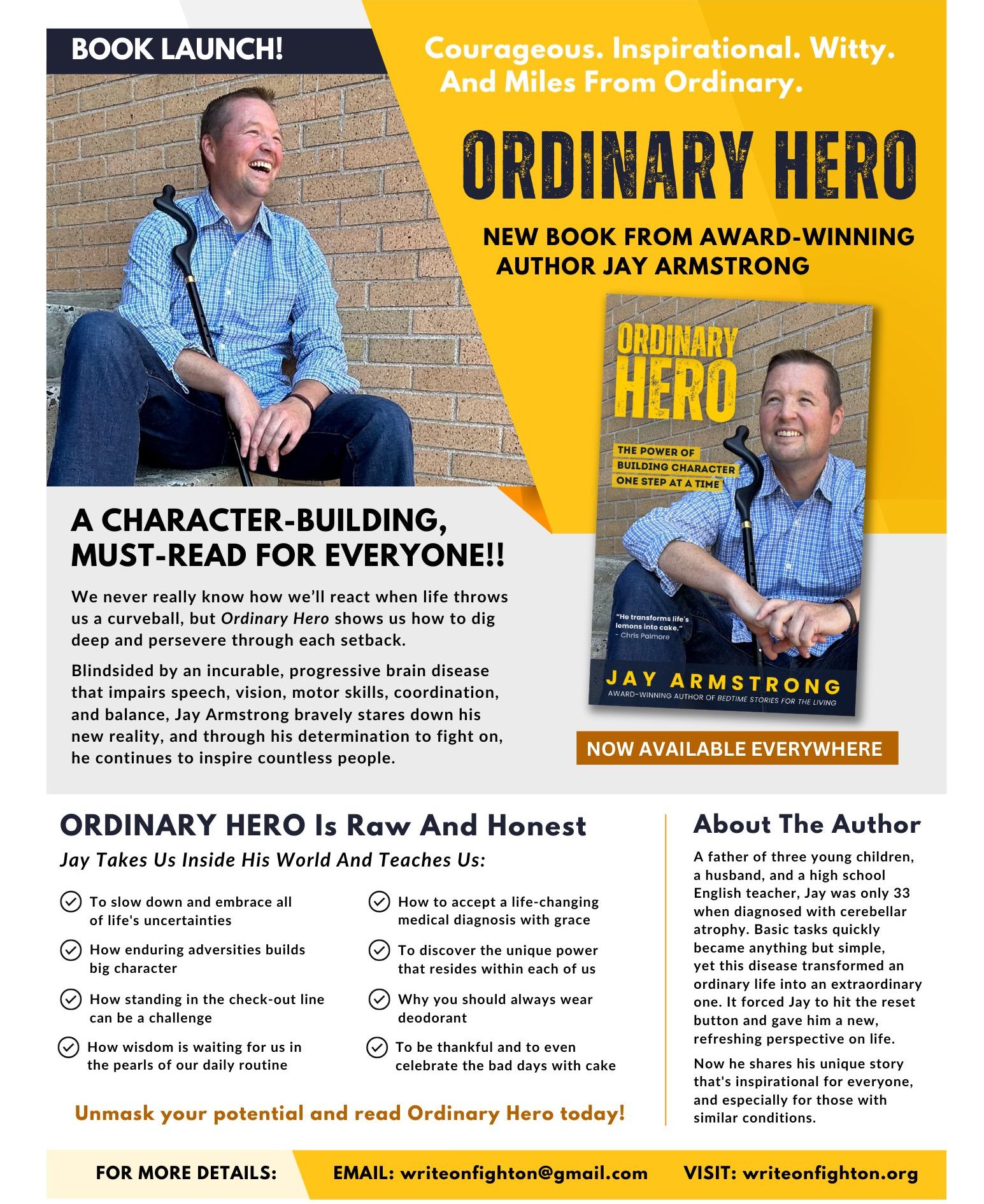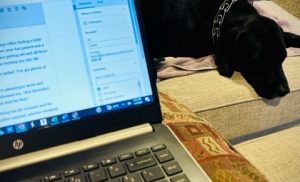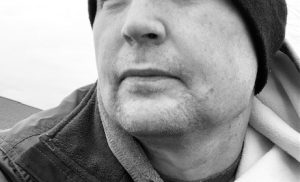The “Introduction” of My New Book: “Roll Forward”
I’m eagerly looking forward to 2023.
Not because I want to see how low gas prices will go or how high egg prices will soar, rather in 2023 I’m publishing a new book. The anticipated release month is December. The working title is: “Roll Forward: Reflections by an Incurably Resilient Father.”
It’s a book about the common, unglamorous resilience it takes everyday to wake up and strive to be the best version of ourselves. How packing our kid’s lunches, taking a morning walk, or accepting our personal weaknesses can make us more resilient.
And so as a little gift, from me to you, I would like to share the unedited version of the “Introduction” to “Roll Forward.”
For me, writing is like breathing. My survival depends on it. And I hope my writing has helped you, even in the smallest of ways, in own survival. I hope my words may have offered you a smile, a tear, a new perspective, a sense of comfort, a better understanding of the human experience.
You have been such loyal companions to my writing and to my life. Your messages, your support and encouragement inspired me to “Roll Forward” even when I didn’t want to. This new book is as much yours as it is mine. Thank you!
Happy Holidays and much love in 2023,
Be well,
Jay

Roll Forward: Reflections by an Incurably Resilient Father
Introduction
I’m not a retired Navy Seal.
I’m not a Shark Tank superstar, a first round draft pick in any sport, a Silicon Valley savant, a Wall Street whiz kid, or a Bitcoin baron.
I’m not a POW, a Civil Rights leader, a ex-cult devotee, a doctor or lawyer or anyone else who has initials before or after their name, a Marvel superhero, an Olympic champion, a former United States President, or a guru of any kind.
I was never wrongly accused or wrongly imprisoned.
I did not grow up poor or have to walk barefoot and up hill to school.
I did not spend summers volunteering in a Peruvian village or winters singing Christmas carols in the cafeteria of a local retirement home.
I never climbed Mt. Everest, completed the Iditarod, or swam the English Channel.
The closest I ever came to enduring the rugged Oregon Trail was playing the video game in my fourth grade Social Studies class at St. Ephrem Elementary sprawled in the soft lawns of the Philadelphia suburbs.
However, I’m a dad, a husband, son, brother, uncle, and a retired high school English teacher from New Jersey who forced his students to listen to Bruce Springsteen.
I walk my dog Maggie May, food shop, coach youth soccer, wear my seatbelt, take afternoon naps on my couch, laugh at Seinfeld reruns, cook dinners for a family of picky eaters, and vote.
My credentials appear vanilla. To write a book on resilience seems a bit out of my league. Maybe I should have written a cook book or a series of witty essays on the evolution of the couch.
However, ten years ago, at age thirty-three years old, I was diagnosed with an incurable brain disease called cerebellar atrophy.
It’s a rare neurological disease that causes the accelerated death of brain cells in the cerebellum. Symptoms include: impaired vision, a decline in motor skills, poor balance, a lack of coordination, cognitive issues, and difficulties talking, breathing, and swallowing. Patients tend to stagger and stumble like drunkards. They handwrite like they’re doing homework in the back of a school bus racing over speed bumps. They’re suspicious of stairs without handrails, taking phone calls, loud social settings, and bicycles.
Stress, fatigue, and a poor diet may exacerbate these symptoms.
Cerebellar atrophy can be genetic or can be caused by an infection, alcohol abuse, or environmental factors such as heavy metals or pesticides. After extensive testing, it’s unknown what caused my disease.
Research indicates that fifty-percent of patients of cerebellar atrophy develop early-onset dementia. And though cerebellar atrophy is not fatal, it significantly increases death-inducing events such as choking and falling.
Thankfully, modern technology has sparked significant advancements in neurological research. And it’s believed a cure will be discovered for cerebellar atrophy in my kids’ lifetime.
That’s great news. I love my kids and if they have the misfortune of developing this cruel disease, the extinction of this in their lifetime, would be a testament to human resolve.
But what about me? What about discovering a cure while I’m still young enough to water ski? What about my happiness? What about a life with a little less struggle?
I mean, am I just supposed to accept this fate? Am I supposed to just smile and make something sweet–Glazed Lemon Scones or Lemon Cheesecake–with the lemons I’ve been handed?
These are questions I mulled one October afternoon as I sat on the couch adding in my Amazon cart, then removing it, then adding, then removing, and then finally buying my first walker.
Because I, along with 160 million other people, am an exclusive Amazon Prime member, my walker appeared on the house’s front door step in a cardboard box two days just after I reluctantly checked out.
Like a responsible adult, I leafed through the instructions before assembling the walker. One section of the direction booklet offered safety tips for walking with a walker: eyes up, shoulders slightly pulled back, step one foot in front of the other, roll forward and enjoy.
As Maggie May looked on, I sat on the living room carpet surrounded by shiny silver walker parts and mumbled to the instruction booklet like a crazed dad on Christmas Eve, “Roll forward? Enjoy? Really instruction booklet? Really? Do you think I really want your stupid walker? How about you roll forward off a cliff?
Maggie May curiously cocked her head and stared at me.
On a post-Covid planet, we move warily from one day to the next. We are tired and anxious and confused. We are lost. Our cell phone batteries are more charged than we are. The world is out of balance. We lack stability and the firm-footing we need to progress.
Again, maybe in my kids’ lifetimes the world will regain its balance. Order will be restored. Maybe acceptance will be easy. Maybe life will be as calm as a homemade casserole.
And again, I love my kids. I do. But what about me What about right now? How can I make my immediate life better? What can I do today that will improve my tomorrow?
I don’t want to live with this disease. Yet, I love myself. And not in a conceited, cringeworthy Instagram way. I mean, I want a life filled with love and ease and cold beer and BBQ ribs. And even if you don’t like beer and ribs, I think you would want the same thing for yourself.
However, there’s something else you should know about me–my disease sometimes makes me wish I was somebody else.
Somebody with spectacular credentials and who doesn’t have an incurable brain disease.
My disease is mysterious to experts and is often unknown by non-experts. Patients with rare diseases often fear judgment and are so scared to be alienated we often struggle to communicate our thoughts and feelings. We internalize everything. We’re afraid of being marginalized. And sometimes we’re ashamed of being ourselves.
After assembling my walker, I thought about how the world could use a walker. Something to provide stability and surety. I opened my laptop and typed:
“Book idea: …walker instruction booklet…Roll Forward…a collection of stories, lessons, and reflections about the resiliency it takes to be yourself and move forward. Note–don’t try too hard to be funny or smart or too much like Dave Sedaris.”
I wrote this book for two reasons. To tell my story. And to convince us that in order to become better parents, better spouses, better friends, better people–and make this world a better place– we, the ordinary people just trying to get from day-to-day, possess spectacular, guru-like power to be resilient.
Maybe you picked up this book because you recognize me from the local food store or because you’re curious about resilience. Maybe a sudden tragedy struck. A death. A disease. An accident or a difficult circumstance that rocked your core.
Maybe you’re wondering if you have the stuff to go on.
The good news is, you’re a part of the human race. Humans, no matter their title or position, have been the most resilient animals to ever wear jeans. We have always found a way, day-in and day-out, to proceed and press on. Big or small, our innate resilience is really extraordinary. And with centuries of evidence proving our daily resolve, I’m confident you can evoke such resilience too. As you traverse your own life, with or without help from a walker, I hope my reflections on everyday resilience ignite your unique heart and empower you to roll forward.
(December 2022)

Buy Here!
Quote of the Week:

December Book Promos:
Are looking for inspiration? Are you searching for a better version of yourself?
This month I joined literary forces for some best-selling authors to promote our books in, Become Inspired. Become You.
Memoirs, Biographies, Self-help books…oh my!
This month I joined literary forces with some best-selling authors to promote our books in the inspiring December Nonfiction Collection.

You miss 100% of the shots you don’t take…
A few months ago, with low expectations, I took a shot and entered “Bedtime Stories for the Living” in the highly regarded, highly competitive international book contest presented by Readers’ Favorite. Readers’ Favorite is an established force in the publishing industry. They have worked withPenguin Random House, Simon & Schuster, and Harper Collins, and have received the “Best Websites for Authors” and “Honoring Excellence” awards from the Association of Independent Authors.
Anyway, just before I was about to take a midday nap, I was informed that this suburban dad had won…
First Prize, the Gold Medal, in the Non-Fiction/Parenting genre!

~~
Are you a reader? Looking for your next good book to read or listen to? Check out my new page “Jay’s Book Shelf” for some book recommendations.
Here’s what I’m currently reading: The Light We Carry by Michelle Obama
If you like this post, you may also like:
Overcoming Monday Morning
~
Assembly Required
~
How to Climb Today’s Mountain
~
Your Voice is the Most Powerful Thing You Own
~~
Jay Armstrong is a speaker and an award-winning author. Despite being diagnosed with a rare neurological disease, that impairs his movement, balance, eyesight, and speech–Jay presses on. The leader of the Philadelphia Ataxia Support Group, he hopes to help you find joy, peace, and meaning in life. For Jay, a good day consists of 5 things:
1. Reading
2. Writing
3. Exercising
4. Hearing his three children laugh
5. Hugging his wife
(Bonus points for a dinner with his parents or a drink with his friends)
Jay hasn’t had a bad day in quite a long time.
You can also visit Jay at jayarmstrongwrites.com








